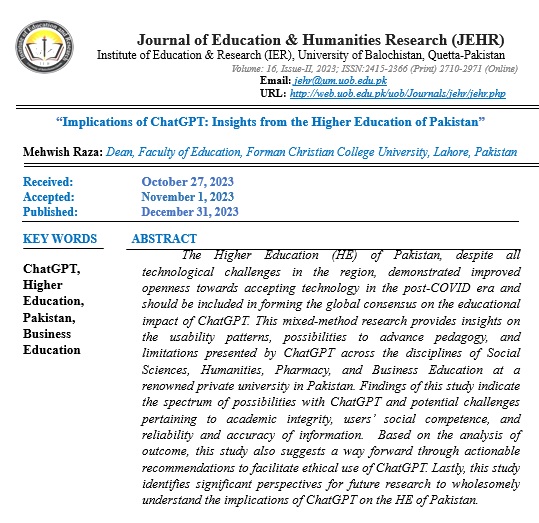Implications of ChatGPT: Insights from the Higher Education of Pakistan
Keywords:
ChatGPT, Higher Education, Pakistan, Business EducationAbstract
The Higher Education (HE) of Pakistan, despite all technological challenges in the region, demonstrated improved openness towards accepting technology in the post-COVID era and should be included in forming the global consensus on the educational impact of ChatGPT. This mixed-method research provides insights on the usability patterns, possibilities to advance pedagogy, and limitations presented by ChatGPT across the disciplines of Social Sciences, Humanities, Pharmacy, and Business Education at a renowned private university in Pakistan. Findings of this study indicate the spectrum of possibilities with ChatGPT and potential challenges pertaining to academic integrity, users’ social competence, and reliability and accuracy of information. Based on the analysis of outcome, this study also suggests a way forward through actionable recommendations to facilitate ethical use of ChatGPT. Lastly, this study identifies significant perspectives for future research to wholesomely understand the implications of ChatGPT on the HE of Pakistan.
References
Asher, S. (2021). COVID-19, Distance Learning, and the Digital Divide: A Comparative Study of Higher Education Institutions in the U.S.A. and Pakistan. International Journal of Multicultural Education, 23(3), 112-134. Retrieved 04 01, 2023, from https://files.eric.ed.gov/fulltext/EJ1328026.pdf
Atlas, S. (2023, 06 2). ChatGPT for Higher E ChatGPT for Higher Education and Pr ducation and Professional De essional Development: A elopment: A Guide to Conversational AI. Retrieved from University of Rhode Island, College of Business Faculty Publications: https://digitalcommons.uri.edu/cba_facpubs/548/
Bozkurt, A., Xiao, J., Lambert, S., Pazurek, A., Crompton, H., Koseoglu, & Suzan. (2023). Speculative Futures on ChatGPT and Generative Artificial Intelligence (AI): A Collective Reflection from the Educational Landscape. Asian Journal of Distance Education, 18(1), 53-130.
Bulut, O., Cutumisu, M., Aquilina, A., & Singh, D. (2019). Effects of Digital Score Reporting and Feedback on Students' Learning in Higher Education. Frontiers in Education, 4. doi:10.3389/feduc.2019.00065
Clarke, B., & Clarke, J. (2018). Predictive Statistics: Analysis and Inference beyond Models. Cambridge University Press.
Cotton, D., Cotton, P., & Shipway, R. (2023). Chatting and cheating: Ensuring academic integrity in the era of ChatGPT. INternational Journal of Innovations in Education and Teaching, 1-12. doi:10.1080/14703297.2023.2190148
Dwivedi, Y., Kshetri, N., Hughes, L., jeyaraj, A., Kar, A., & Baabdullah, A. K. (2023). So what if ChatGPT wrote it?” Multidisciplinary perspectives on opportunities, challenges and implications of generative conversational AI for research, practice and policy. International Journal of Information Management, 71. doi:https://doi.org/10.1016/j.ijinfomgt.2023.102642
Eke, D. (2023). ChatGPT and the rise of generative AI: Threat to academic integrity? Journal of Responsible Technology, 13. doi:10.1016/j.jrt.2023.100060
Kshetri, N. (2023). ChatGPT in Developing Economies. IEEE Xplore. doi:10.1109/MITP.2023.3254639
Lund, B., & Wang, T. (2023). Chatting about ChatGPT: how may AI and GPT impact academia and libraries? Library Hi Tech News, 40(3), 26-29. doi:10.1108/LHTN-01-2023-0009
Quora. (2023, 06 12). Quora: Is ChatGPT working in Pakistan? Retrieved from Quora: https://www.quora.com/Is-chatGPT-working-in-Pakistan#:~:text=Despite%20the%20disruptions%2C%20Pakistanis%20are,recommendations%20and%20create%20automated%20chatbots.
Raza, M. (2022). Interactive radio instruction–a legacy of COVID-19 for marginalized adolescent girls of Baluchistan. Journal for Multicultural Education, 16(1), 55-63. doi:https://doi.org/10.1108/JME-01-2022-0003
Shidiq, M. (2023). The Use of Artificial Intelligence-Based ChatGPT and Its Challenges for the World of Education: From the Viewpoint of Development of the Creative Writing Skills. Proceeding of International Conference on Education, Society and Humanity, (pp. 352-357). Kuala Lumpur. Retrieved 06 2, 2023, from https://ejournal.unuja.ac.id/index.php/icesh/article/view/5614/2065
Stefonik, B. (2023, 06 06). https://foothill.edu/news/chatgpt.html. Retrieved from https://foothill.edu/psychology/pdf/2023_ChatGPT%20Survey_Student%20Responses_Foothill%20College.pdf
Sultan, P., Khan, M., Lee, S., & Oo, A. (2023). Will a Paradigm Shift Emerge in Higher Education Institutions After Covid-19? In P. Sultan (Ed.), Innovation, Leadership and Governance in Higher Education: Perspectives on the Covid-19 Recovery Strategies (pp. 23-33). Springer Singapore. doi:10.1007/978-981-19-7299-7_22
Taber, K. (2014). Methodological Issues in Science Education Research: A Perspective from the Philosophy of Science. In P. a. International Handbook of Research in History, & M. R. Matthews (Ed.), International Handbook of Research in History, Philosophy and Science Teaching. (pp. 1839-1893). Springer.
Tilili, A., Shehata, B., Adrakwah, M., Bozkurt, A., Hickey, D., & Agyemang, B. (2023). What if the devil is my guardian angel: ChatGPT as a case study of using chatbots in education. Smart Learning Environments, 10(1), 1-24.




